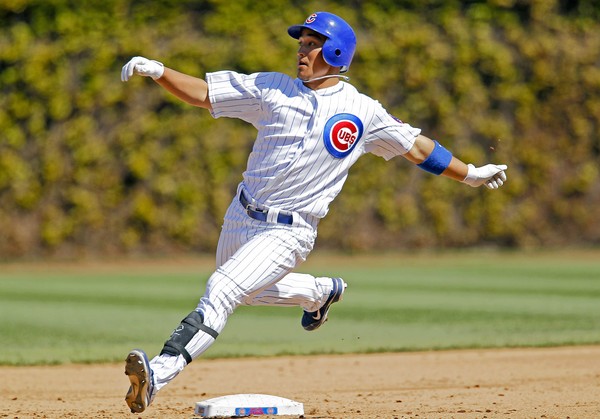
Lots of people are predicting mediocrity from both the Sox and Cubs, and it's certainly the most likely scenario. Neither team made any compelling off-season acquisitions; after years of profligate spending, both teams are either rebuilding (Cubs) or semi-rebuilding (Sox). (The big news out of opening week? What the Sox's former manager said. Sigh.) For the former, it's a bit of a surprise after the legacy of big-time free agents that Theo Epstein left behind in Boston, which brought them playoff success but led to a Cold War with the Yankees and one of the biggest payrolls in baseball.
Over the offseason, Epstein let big-ticket players go, like Aramis Ramirez, or offered them incentives to depart, like Carlos Zambrano, while filling the ranks with marginal veterans with respectable upside. So one number to follow besides the runs on the board and the win-loss columns is payroll, as the team puts away money with an excellent crop of free-agent pitchers queued up for 2013.
And on that count, at least, both teams have done a fine job—especially the Cubs. Here's their opening-day payroll from 2008-2012:
Total/Rank/Average/Median
$118,345,833/8th/$4,383,179/$3,175,000
$134,809,000/3rd/$5,392,360/$2,200,000
$146,609,000/3rd/$5,429,962/$2,125,000
$125,047,329/6th/$5,001,893/$1,600,000
$88,197,033/15th/$3,392,193/$1,262,500
The Cubs dropped $40 million in salary over the offseason, and nine slots in the rankings. Until very recently one of baseball's biggest-spending teams, they fell immediately to the middle of the pack, the smallest budget of the major-market teams. Even with the $15 million owed Zambrano factored in, they'd be a mere 10th in baseball. Which goes against the grain, and not just for the big city teams:
Even without local television deals, however, money is flowing into MLB’s coffers. Whether it’s money through MLB Advanced Media, the gate, or (shortly) through the national television deals, clubs are spending. The Reds, for example, don’t have the local television money flowing in but are spending lavishly. In baseball’s second-smallest media market, they signed Joey Votto to the third-highest active contract at 10 years and $225 million…. Get ready; a steady flow of “green” is coming. Next season, the total amount spent on Opening Day payrolls will crack $3 billion.
And the White Sox:
$121,189,332/5th/$4,488,493/$1,950,000
$96,068,500/12th/$3,694,942/$1,112,500
$105,530,000/7th/$4,058,846/$2,500,000
$127,789,000/5th/$4,732,925/$2,750,000
$96,919,500/11th/$3,876,780/$530,000
The White Sox have cut back a bit less aggressively, but the interesting figure there is the Sox's low median salary: they have a lot of low-paid players, many of whom they'll be dependent on this season. Chris Sale, Addison Reed, Hector Santiago, Brent Morel, Alejandro De Aza, Philip Humber, and Gordon Beckham all make less than $1 million per year.
Between 2011 and 2012, three teams dropped their payrolls by more than 20 percent: the Mets (22 percent), the White Sox (24 percent), and the Cubs (30 percent). Out of all the teams in the majors, the Cubs and Sox are the ones who did the most intensive spring cleaning. They won't win a lot this year, but if you're fiscally aware enough to judge them on money spent per win, both teams should look a bit better.
Photograph: Chicago Tribune



